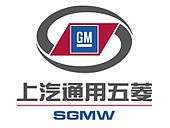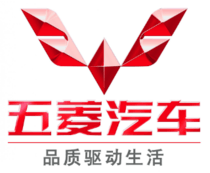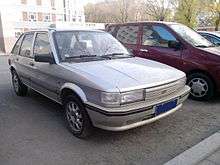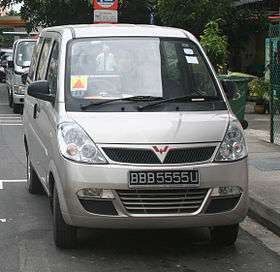SAIC-GM-Wuling
 | |
Native name | 上汽通用五菱汽车股份有限公司 |
|---|---|
| Joint venture | |
| Industry | Automotive |
| Founded | Liuzhou, Guangxi, China November 18, 2002 |
| Headquarters | Liuzhou, Guangxi, China |
Area served | China |
Key people | |
| Products | Mini-trucks, microvans, passenger cars |
| Owner |
|
Number of employees | 20,000[4] |
| Subsidiaries |
Baojun Etsong Vehicle Manufacturing |
| Website | SGMW |
SAIC-GM-Wuling Automobile (上汽通用五菱汽车股份有限公司 and abbreviated as SGMW) is a joint venture between SAIC Motor, General Motors, and Liuzhou Wuling Motors Co Ltd. Based in Liuzhou, Guangxi Zhuang Autonomous Region, in southwestern China, it makes commercial and consumer vehicles sold in China under the Wuling and Baojun marques, respectively. A major mass-volume producer in the Chinese interior, in 2011 SGMW sold 1,286,000 vehicles in China, 1,445,000 in 2012, and aims to sell 2 million cars annually.[5] Its offerings range in price from US$5,000 to US$10,000.[6]
SGMW is one of the largest manufacturers of microvans in China. Known as mianbao che, or “bread box cars,” these pint-size commercial vehicles are no larger than a compact car and have sold well in the poorer interior.[7] One of its popular microvans is the Wuling Sunshine. Selling more than 450,000 units per year,[8] SGMW has claimed no one model outsells it in China.[9]

Both SGMW and Liuzhou Wuling Automobile Industry Co. Ltd. use the Wuling brand name and the red, five-diamond "W" logo.
History
While Wuling microvans have been manufactured since 1982,[10] in 1986 Wuling's predecessor company, Liuzhou Automotive Industry Corporation, reached an agreement with Mitsubishi Motors to assemble the L100 type Mitsubishi Minicab.[11] Originally, 90% of parts were imported, but gradually local parts content increased. This small van was sold as the Liuzhou Wuling LZ 110.
In 2002, the joint venture SAIC-GM-Wuling was formed, with SAIC taking 50.1% of the shares, GM 34%, and Wuling Group 15.9%.[12] Wuling transferred the production of microvans and small trucks to the new company. Since at least 2008, GM sought to increase its ownership achieving this aim c. 2011.[13] Its stake rose to 44%[14]—leaving Wuling with 5.9%.[15]
In 2010, SGMW created a passenger car brand to compete against indigenous products, Baojun.[16] The company has sold a passenger vehicle, the Chevy Spark, since at least 2007, however.[8]
In late 2012, ten years after the formation of the joint-venture, SGMW opened a new factory for the production of Baojun passenger cars in Liuzhou, Guangxi Zhuang Autonomous Region, ready to produce 400,000 units per year.[17] A factory with capacity for the same number of power trains is also being built.[17]
- Etsong acquisition

Best known for its tiny offerings, in 2005 SGMW acquired diminutive Etsong Vehicle Manufacturing, a small-scale manufacturing concern based in Qingdao, China. The factory was originally set up in 1997 by a Chinese tobacco company and was then briefly owned by the First Automobile Works (FAW Jiefang) before the SAIC group took over the factory. Since 2000, a number of Austin Maestro/Montego amalgams had been produced under the Etsong Lubao and Etsong Lande nameplates, but SGMW did not recommence production of these aged models after the takeover. Instead, the factory is used to augment SGMW mini-vehicle capacity.[18]
- Baojun
Perhaps the culmination of GM's dream to build a "farmer's car",[19] the Baojun brand was established in 2010 and aims to sell to consumers in third and fourth tier Chinese cities.[20] Such large- and medium-sized Chinese cities are not counted among the top four in terms of population and contribution to GDP.[21]
Baojun currently competes for consumers with indigenous brands like Chery and Geely.[16] Its two offerings include, as of 2012, the 630, a small four-door sedan, and the Lechi minicar.[16] The latter is an updated version of the first generation Daewoo Matiz and was previously sold under the Chevrolet brand name. During the transition between brands, the Lechi was offered as both a Chevrolet and a Baojun.[22]
Products
- Microvans

- Wuling Sunshine LZW 6371-6376/6390 (LWB)/1027 (pickup) - this is sometimes referred to as the Wuling Zhiguang (之光)
- Wuling Rongguang (facelifted Wuling Dragon van, Suzuki Carry origins)
- Wuling Hongtu - Sold as the Chevrolet N200 in South America, Middle East, and North Africa[23]
- Wuling Xingwang
- Wuling Liuzhou LZ 110 - license built 1977-1984 Mitsubishi Minicab, no longer produced
- Wuling Dragon LZW 1010/6320-6360/6430
- Wuling City Breeze LZW 6370 (under a Daihatsu Zebra license) - minivan
- Wuling Windside
- MPVs
- Baojun
Operations
The company has a number of production bases. These include a facility in Liuzhou, Guangxi,[16] and a plant in Qingdao, which it had purchased c. 2007.[8]
Production figures
| year | China total | Wuling | Baojun |
|---|---|---|---|
| 2009 | 1,000,000+[4] | 1,000,000+ | 0 |
| 2010 | 1,226,860.[24] | ? | ? |
| 2011 | 1,285,820[22] | ? | ? |
| 2012 | 1,445,203[25] | ? | ? |
Export
While the majority of SGMW products are sold domestically in China, some export does occur. In 2009, Wuling began to export its small commercial vehicles to South America, the Middle East, and North Africa where they are sold under the General Motors Chevrolet brand.[23] These exports may constitute knock-down kits with final assembly only done in the receiving nation as is the case in Egypt.[26][27]
As of 2010, GM and SAIC have established an equally owned joint venture to export SGMW products to India.[13]
Wuling mini-trucks were exported in limited numbers to the United States from 2004 to 2005. SGMW USA, a Cobra Motors company, imported and distributed the vehicles. Those trucks were limited to off-road use (i.e. private property), and were primarily marketed as industrial and commercial vehicles.[28]
References
- ↑ "SGMW's Baojun Brand to Sell Passenger Cars in China". General Motors (Press release). 2010-07-18.
- ↑ "Raymond Bierzynski Appointed Executive Vice President of SAIC-GM-Wuling". media.gm.com (Press release). 2012-10-12. Retrieved 8 October 2013.
Bierzynski served in leadership roles in China as president of the Pan Asia Technical Automotive Center (PATAC) from 2004 to 2007, and vice president of GM Asia Pacific and GM executive director of China Engineering from 2007 to 2009
- ↑ "About GM China". gmchina.com. 2013. Retrieved 1 October 2013.
- 1 2 Raghav Narsalay, Ryan T Coffey, Cherry Lu Cui and John Gong (2012). "SGM Wuling: Bringing affordable vehicles to low-income consumers" (PDF). Accenture.
- ↑ For 2011 production figures and goal of 2 million units annually, see "Chevrolet Lechi to Be Sold Under Baojun Brand in China". GM Media: China (News release). General Motors. 2012-08-15.
- For 2012 production figures, see "About GM China". gmchina.com. 2013. Retrieved 1 October 2013.
- ↑ For $5,000 microvan, see Samilton, Tracy (February 18, 2010). "GM's $5,000 Minivan, A Hit In China". npr.org. National Public Radio. Retrieved 12 October 2013.
- For $10,000 sedan, see Shirouzu, Norihiko (Nov 18, 2012). "GM ups capacity in no-frills China car market". reuters.com. Thompson Reuters. Retrieved November 23, 2012.
- ↑ For "bread box cars," see Webb, Alysha (2012-11-24). "To see the future for GM in China look at the SAIC-GM-Wuling joint venture". chinaev.wordpress.com ("Alysha Webb's ChinaEV Blog"). Retrieved 8 October 2013.
In late 2010, however, GM boosted its share to 44%, leaving Wuling with 5.9%.
- For strong rural sales, see Raghav Narsalay, Ryan T Coffey, Cherry Lu Cui and John Gong (2012). "SGM Wuling: Bringing affordable vehicles to low-income consumers" (PDF). Accenture.
- 1 2 3 Schifferes, Steve (17 May 2007). "Cracking China's car market". bbc.co.uk. BBC. Retrieved November 29, 2012.
The (Wuling Sunshine) costs $3,700 (£1,872), has a 0.8 litre engine, have a top speed of 60 mph, and weighs less than 1000kg
- ↑ "SAIC-GM-Wuling Automobile Co. Ltd. (SAIC-GM-Wuling)". media.gmchina.com. 2013. Retrieved 9 October 2013.
- ↑ "Export Business: Brief Introduction - 五菱英文版". sgmw.com.cn. 2013. Retrieved 8 October 2013.
Since the first WULING vehicle was exported to Thailand in 1992, WULING vehicle has been exported to more than 40 countries and regions like Centre & South America, Middle-east, Africa, and South-east Asia. And SGMW has increasingly played a significant role on the world’s automobile market.
- ↑ "Mitsubishi to assemble vans, trucks in China". Nihon Keizai Shimbun. Tokyo: 12. 1986-03-01.
- ↑ White, Joseph B. (20 Apr 2007). "For GM in China, Tiny Is Mighty; Wuling Venture Plans Expansion as Sales of Small Cars Surge". Wall Street Journal. Dow Jones and Company. p. A9.
- 1 2 Shirouzu, Norihiko (12 Nov 2010). "Corporate News: GM to Strengthen China Stake". Wall Street Journal. Dow Jones and Company: B2.
- ↑ "GM Retains No. 1 China Sales Rank". bloomberg.com. Bloomberg LP. Aug 28, 2011. Retrieved 12 October 2013.
- ↑ Webb, Alysha (2012-11-24). "To see the future for GM in China look at the SAIC-GM-Wuling joint venture". chinaev.wordpress.com ("Alysha Webb's ChinaEV Blog"). Retrieved 8 October 2013.
In late 2010, however, GM boosted its share to 44%, leaving Wuling with 5.9%.
- 1 2 3 4 Shirouzu, Norihiko (Nov 18, 2012). "GM ups capacity in no-frills China car market". reuters.com. Thompson Reuters. Retrieved November 23, 2012.
- 1 2 "SAIC-GM-Wuling Opens Passenger Car Production Base". media.gm.com (Press release). 2012-11-18. Retrieved 8 October 2013.
Baojun products are targeted primarily at first-time car buyers in China’s second-, third- and fourth-tier cities.
- ↑ "GM buys old Chinese car factory". The Economic Times. Bennett, Coleman & Co. Ltd. 2005-06-03. Retrieved 2012-11-30.
- ↑ McGregor, Richard (20 July 2001). "GM looks to China for auto triple alliance". Financial Times. Pearson: 31.
- ↑ Fang Yan; Wills, Ken (Nov 22, 2010), "GM unveils new brand in China, targets smaller cities", reuters.com, Thompson Reuters, retrieved November 30, 2012,
Those big coastal cities are rapidly becoming less than a quarter of our business, and the real growth is in what we call tier three, tier four cities," Terry Johnsson, vice president of GM's China operations, told Reuters in an interview. "It wouldn't be unexpected to see 60 percent of the business in tier 3 and tier 4 cities (in five years).
- ↑ Mullich, Joe. "China's "Second-Tier" Cities Take Off". Special Advertising Section Presented by Cathay Pacific. The Wall Street Journal. Dow Jones and Company, Inc. Retrieved June 4, 2012.
- 1 2 "Chevrolet Lechi to Be Sold Under Baojun Brand in China". GM Media: China (News release). General Motors. 2012-08-15.
- 1 2 Li Fangfang (2009-08-14). "Wuling minis go global under GM Chevrolet brand". China Daily. Retrieved 2010-12-02.
- ↑ "SAIC-GM-Wuling Automobile Co. Ltd. (SAIC-GM-Wuling)". GM China. Retrieved November 1, 2011.
- ↑ "GM 2012 global sales rise 2.9 pct on strong Chevy demand". Reuters. 14 January 2013. Retrieved 20 January 2013.
- ↑ from "just-auto.com" (2011-11-23). "CHINA: SAIC-GM-Wuling to Start Assembly of Chevy Move in Q3/2012". HighBeam Business. Chicago, IL (USA): Cengage Learning. Retrieved 1 October 2013.
Vehicle kits will be supplied by GM China's SAIC-GM-Wuling (SGMW) joint venture
- ↑ "GM Egypt to Produce Chevrolet Move Passenger Van in 2012" (PDF). GM Egypt (Press release). 2011-12-13. Retrieved 10 October 2013.
GM Egypt plans to produce about 5,000 units annually for sale in Egypt starting third quarter of 2012. Vehicle kits will be supplied by GM China’s SAIC-GM-Wuling joint venture. [...] The Chevrolet Move is based on the Wuling Rong Guang,
- ↑ "MiniTruck Products". SGMW USA MiniTrucks, Off Road Utility Vehicles and Low Speed Vehicles (LSV). SGMW USA. Archived from the original on 2007-09-30.